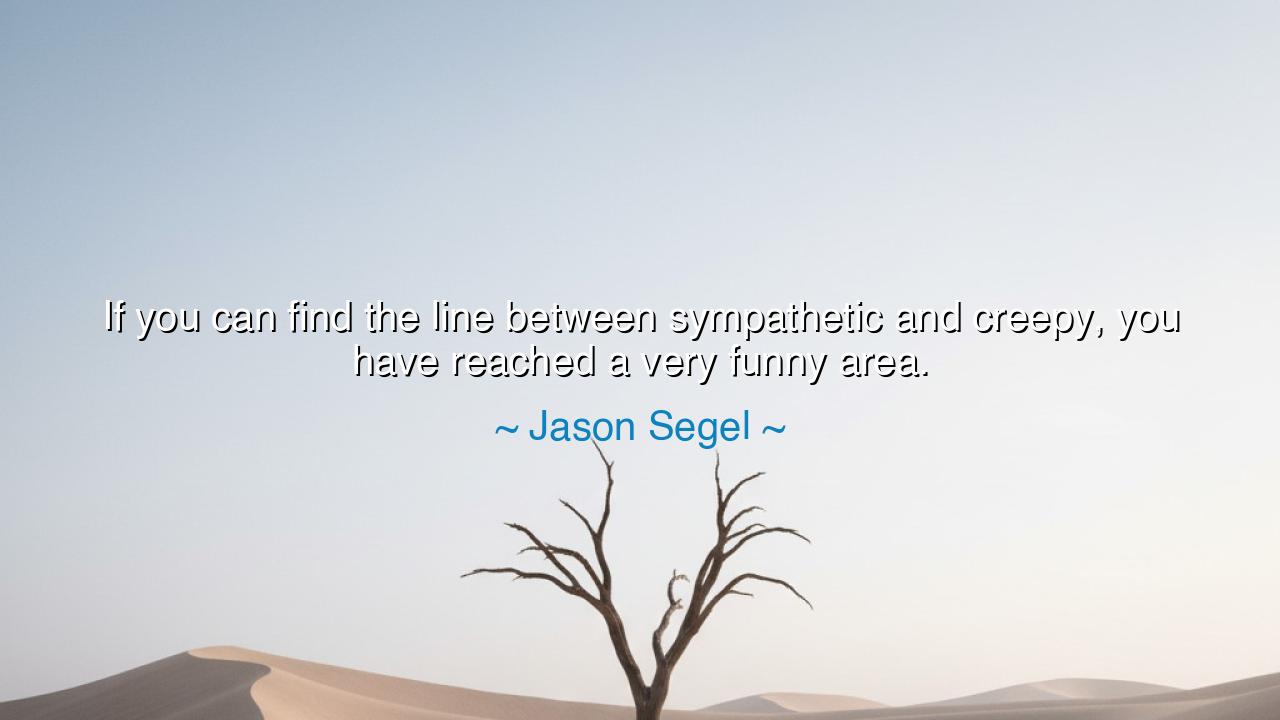
If you can find the line between sympathetic and creepy, you have
If you can find the line between sympathetic and creepy, you have reached a very funny area.






“If you can find the line between sympathetic and creepy, you have reached a very funny area.” Thus spoke Jason Segel, a modern bard of laughter and melancholy — a man who has wandered through the wild frontier between the absurd and the sincere. Beneath his jest lies a truth both delicate and profound: that humor lives in the tension of opposites, in that narrow place where vulnerability meets discomfort, and humanity reveals its strange, luminous face. To walk this line is no easy feat, for it demands both courage and compassion — the ability to expose the awkward heart of life without cruelty, to make others laugh not at pain, but through it.
In the age of the ancients, the comedian was a truth-teller, no less sacred than the philosopher or the poet. He wielded laughter as a mirror to the soul, reflecting our foolishness with affection rather than scorn. When Segel speaks of the “line between sympathetic and creepy,” he invokes this same ancient art — the art of balance. Sympathy draws the listener close; it reminds us that we are not alone in our strangeness. Creepiness, on the other hand, unsettles — it touches the unease that hides beneath the skin of our civility. But between them, where warmth meets discomfort, there blooms the truest kind of humor — the laughter of recognition. For what is comedy, if not the revelation that we are all strange, and all beloved in our strangeness?
Consider the stories Segel himself told — of characters who fumble with love, who try too hard, who expose too much of themselves. In Forgetting Sarah Marshall, he bares the pain of heartbreak with both shame and tenderness, turning vulnerability into hilarity. The audience laughs, not because they mock him, but because they see themselves in him. That is the magic of the “funny area” — it allows people to face the uncomfortable truths of their own hearts, safely wrapped in the sound of laughter. Segel’s gift is not in shock or cruelty, but in this balance: he humanizes the awkward, giving dignity to the very moments we most wish to hide.
In another age, the dramatist Aristophanes did much the same. In his plays, he mocked the follies of Athens — its leaders, its lovers, its philosophers — yet beneath every satire was a current of empathy. He understood that laughter could cleanse the spirit and teach humility. He too danced along the dangerous line: to ridicule too harshly was to wound, but to soften too much was to lose the bite of truth. The great art lay in finding the edge, that place where comedy touches the uncomfortable but does not descend into cruelty. The laughter that arises there is not hollow — it is redemptive.
This line between sympathy and discomfort is not confined to the stage. It runs through every human relationship. To understand another deeply is to see both their beauty and their awkwardness. The friend who can make you laugh at your flaws without making you feel small has found this sacred balance. In a world where mockery often replaces humor, and shock masquerades as wit, Jason Segel’s wisdom reminds us that true comedy comes from compassionate honesty — from daring to look at life’s strange corners without turning away.
So, the lesson is this: if you wish to be truly funny, or truly wise, learn to stand at the threshold of discomfort without crossing into cruelty. Dare to reveal your own absurdity, for in your vulnerability others will find courage to face theirs. Humor that wounds divides the heart; humor that heals unites it. Seek that laughter which makes both the speaker and the listener more human — that which turns shame into connection, and fear into fellowship.
Therefore, my friend, do not fear the awkward or the strange. Within it lies the pulse of truth. When you tell your stories, let them tremble with honesty — not perfect, not polished, but alive. Find the line where sympathy meets strangeness, and let your laughter live there. For it is there, in that tender borderland between comfort and unease, that the heart recognizes itself and laughs — not out of mockery, but out of love for this fragile, ridiculous, and beautiful thing we call being human.






AAdministratorAdministrator
Welcome, honored guests. Please leave a comment, we will respond soon